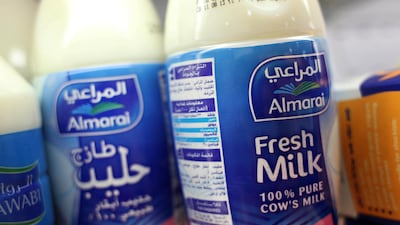Saudi Arabia's Almarai, the biggest dairy company in the Middle East, reported a slight rise in first quarter net income on the back of higher revenue in export markets.
Net profit attributable to the company’s shareholders for the three months to the end of March climbed to 385.9 million Saudi riyals ($102.9m), up from 383m riyals in the same period in 2020, Almarai said in a statement to Saudi Arabia's Tadawul stock exchange, where its shares trade. Earnings before interest, taxes and zakat, depreciation and amortisation reached 897.8m riyals, a year-on-year increase of 1.1 per cent.
Revenue for the quarter rose 1.46 per cent on the prior-year period to 3.64 billion riyals, driven by the dairy business.
In Saudi Arabia and the broader GCC region, Almarai's revenue dropped 1.6 per cent and 8.9 per cent, respectively, but a 47 per cent increase to other markets compensated for lower sales elsewhere. In the dairy arm, net profit jumped 6.5 per cent on the back of higher sales to “Egypt, Jordan and [other] export markets”.
Despite this, higher feed cost and lower subsidies for the segment continued to “adversely impact profitability, although it was partially negated by strong cost control on payroll and operating overheads”, the company said in the bourse filing.
Quarterly net income of its bakery business dropped 35.7 per cent, weighed down by lower sales volume and school closures. Net income from its poultry business decreased by 24.3 per cent.
“In a benign Q1 trading environment in GCC countries, Almarai’s operations have continued to demonstrate resilient profitability management. Structural cost pressures driven by subsidy reduction and higher feed cost were managed with strong cost controls,” the company said.
"Almarai expect current trading conditions to persist in the short term [and it] ... will continue to navigate the existing market conditions with various scenario planning options."
Almarai’s selling and distribution expenses for the first quarter decreased by 7.5m riyals, or 1.2 per cent year-on-year, on improved cost management. General and administrative expenses fell 2.5 per cent. However, other expenses increased by 30.7m riyals, mainly due to the base effect from last year when a one-off gain of 30m riyals was recognised from the sale of arable assets.
Impairments on financial assets fell by 28.4m riyals as the “credit situation has remained stable and did not require additional provision similar to last year”. The company’s funding costs also declined by 36.1m riyals as a result of lower interest rates and ongoing deleveraging, it said.
Almarai spent 299.1m riyals on investments activities, 45m riyals lower year-on-year after adjusting for the redemption of a Dh585m time deposit in the first quarter of last year. Cash used in investing activities represent 8.2 per cent of the company’s revenue.
In March, Almarai agreed to buy Bakemart’s business in the UAE and Bahrain for $25.47m as it looks to expand its product range across the region.
The deal to acquire 100 per cent of the company will "enhance Almarai's ability to increase its contribution to the kingdom's food security, in alignment with the kingdom's Vision 2030 programme", it said in a statement at the time.


